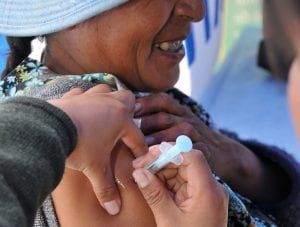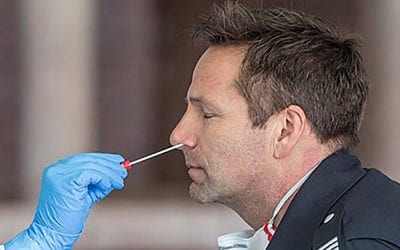To return to the U.S. from an international destination, citizens must do COVID testing within 3 days of their return flight.
Unless they’re prepared, if the test is positive, they must endure what could be a more difficult and costly quarantine than necessary at their destination.

After a 15 minute wait, the result is in. It’s … OMG … “You tested positive?”
What do you do now?
Even if you’re prepared for quarantine, you’ll be busy making arrangements if you tested positive for COVID before returning home.
Hopefully, you’ve preplanned for this possibility. There’s a lot you’ll have to do. You’ll have to immediately call your airline to postpone your flight home after your quarantine and negative COVID-19 test. You’ll need to immediately arrange for the quarantine, including both your extended stay and meals, plus a test to eventually prove you’re no longer infected.
I have planning suggestions for U.S. citizens and residents traveling internationally in case you become infected with COVID-19 while away from home.
• Don’t travel internationally if you’re not vaccinated. Statistically, if you’re fully vaccinated, it’s far less likely you’ll be hospitalized for COVID if you become infected. You don’t want to have to be hospitalized in a foreign country, especially if you don’t speak the local language well.
• Research all the CDC’s COVID policies before you book your trip. You need to follow their regulations precisely to be able to return to the U.S. For example, every U.S. citizen and legal permanent resident, two years old and up, returning to the U.S. from a foreign country must have a negative COVID test within three days of their return to the U.S.
Many U.S. health insurance policies such as Medicare have limited or no international coverage.
• Make sure you have full health insurance that will pay for any medical costs at your destination. Many U.S. health insurance policies don’t include international coverage or they severely limit its coverage. For example, Medicare doesn’t provide coverage outside the U.S., though some Medigap and Medicare Advantage policies have limited international coverage.
If your health insurance policy doesn’t cover you internationally or provides limited coverage, purchase travel health insurance with full international coverage. Make sure it covers COVID. Particularly if you have a chronic health condition, beware of pre-existing condition exclusions. Investigate possible travel health insurance policies carefully before booking your trip, to get full coverage you might have to buy the policy within days of your journey’s initial booking.
• Fully research your destination’s COVID-19 regulations and laws, particularly their quarantine policies and procedures for foreigners. Running afoul of their laws could be very costly.
Find out your international destination hotel’s quarantine policy before you book it, in case you tested positive for COVID-19.
• Before you book your destination’s hotel, determine its quarantine policy. Don’t forget to inquire about arranging to eat. You won’t have time to find good quarantine solutions after you test positive, so have a quarantine plan before you leave on your trip.
• You might want to consider enrollment in a medical evacuation program that would allow you to reenter the U.S. while infected and quarantine at home. The CDC allows people who have tested positive for COVID-19 to return to the U.S. via private or medical transport. One service that stands out is Covac Global. They don’t require hospitalization for COVID prior to evacuation. Of course, medical evacuation isn’t inexpensive.
• Enroll in the U.S. Department of State’s Smart Traveler Enrollment Program (STEP). It’s free. It allows U.S. citizens traveling internationally to notify the State Department of their trip details. This enables the local U.S. Embassy to contact you in an emergency. Have all of your destination’s U.S. embassy contact information in case you need their help. They can help a family from home contact you.
Bring enough medication to fulfill your needs throughout a COVID quarantine if you test positive prior to returning to the U.S.
• Bring enough prescription and non-prescription medication from home to last for at least 30 days after your scheduled departure in case you need to quarantine for COVID.
• Your quarantine will last at least seven days if you test positive. Without some kind of entertainment, you’ll likely quickly go stir crazy. I bring a tablet and a laptop with me for entertainment and communication.
You’ll have a significant need for communication if you must quarantine. A smartphone is the best device for your communication with its phone, text, web, and email capability.
• Have a smartphone for international travel. Having a smartphone can help you through quarantine with its phone, text, web, and email capability. It can hold your detailed health information to help physicians at your destination to help you. Enroll in an international calling plan. Without one, the cost of using the smartphone could pile up quickly.
• Consider bringing a laundry kit. I use the Scrubba. At the end of your trip you’ll likely have only a few pieces of clean clothing to wear during your quarantine. Sinks and tubs with hotel toiletries aren’t great for clothes washing.
While it’s unlikely that you’ll test positive for COVID just before your return to the U.S., the odds aren’t zero. If you’re unprepared for a positive COVID test result, your quarantine will likely be far more difficult than necessary. Remember the adage, “Hope for the best, but prepare for the worst.”
READ ALSO:
20 years later — 10 big 9/11 aviation changes
Online booking mistakes — slow down for better travel
After many years working in corporate America as a chemical engineer, executive and eventually CFO of a multinational manufacturer, Ned founded a tech consulting company and later restarted NSL Photography, his photography business. Before entering the corporate world, Ned worked as a Public Health Engineer for the Philadelphia Department of Public Health. As a well known corporate, travel and wildlife photographer, Ned travels the world writing about travel and photography, as well as running photography workshops, seminars and photowalks. Visit Ned’s Photography Blog and Galleries.



